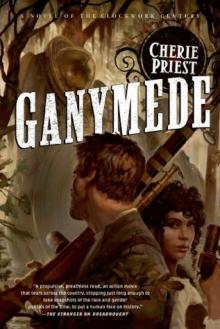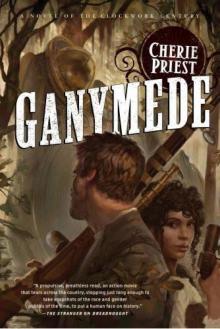- Home
- Cherie Priest
Dreadnought tcc-3
Dreadnought tcc-3 Read online
Dreadnought
( The Clockwork Century - 3 )
Cherie Priest
Cherie Priest. Dreadnought
(The Clockwork Century – 3)
To Jerry and Donna Priest
I used to joke that they could come home and find a bus full of first-graders crashed on the front lawn, caught in the cross fire of a bank robbery, in the midst of an alien invasion . . . and they’d have the situation under control in under a minute. But for the record, I was only kind of joking.
This is a work of fiction, featuring impossible politics, unlikely zombies, and some ludicrously incorrect Civil War action. I hope you enjoy it! And I’d like to thank you in advance for not sending me e-mail to tell me how bad my history is. I think we all know I’ve fudged the facts rather significantly.
(Except the zombie parts.)
Acknowledgments
At the risk of sounding redundant, my first paragraph of thanks and warm kudos goes to the usual suspects: my husband, Aric Annear, for not yet admitting that he’s sick to death of hearing about these stories, bless his heart; my editor, Liz Gorinsky, for saving me from many a prose misstep and being my in-house champion over at Tor; my agent, Jennifer Jackson, for making all the hard phone calls and letting me periodically stomp around like a tiny Godzilla; and to my publicity team at Tor-Patty Garcia and Amber Hopkins-for meeting me in strange cities and booking my travel so I don’t have to.
And I can’t have a thanks page without a nod to my day-job chief, Bill Schafer. Thanks for helping me keep the lights on without crowding out the writing work, dude; and thanks to Yanni Kuznia, because she seriously does manage to do it all, and I don’t know how-but I sure am glad for it.
Thanks also to Andrea Jones, she of the copious Civil War knowledge-for always answering dumb questions with intelligent, interesting, sometimes wacky (but always cool-as-hell) speculation. She and her usual suspects at the Manor of Mixed Blessings have become my go-to crowd for obscure trivia and strange guesses. Thanks be likewise to Christina Smith at the Texas Ranger Hall of Fame and Museum for her input on “Ranger” usage and treatment. Because honestly, I just didn’t know.
Likewise, thanks to Louisa May Alcott for writing letters home when she was working at a Washington, D.C., hospital during the Civil War. Her collection of “Hospital Sketches” was immensely helpful in imagining and re-creating a fictional version of the Robertson facility in Richmond.
Epic gratitude and much love go to everyone in the secret clubhouse that serves the world; and to Warren Ellis for being Warren Ellis; and to Wil Wheaton for being Wil Wheaton. Also I send it out to Team Seattle-Mark Henry, Caitlin Kittredge (even though she’s leaving us for Massachusetts), Richelle Mead, and Kat Richardson-for giving me a posse of writer peeps with which to hang; to Duane Wilkins for helping manage the signed cargo at the University Book Store; and to the crew at Third Place Books (hi Steve and Vlad!) for their continuing support as well.
More hearty thanks go to Greg Wild-Smith, my original and forever webmaster (unless I eventually drive him off with my crazy); to Ellen Milne and Suezie Hagy for the brunches, company, the organizational skills, and the cat-sitting services.
And finally, thanks to my dad and stepmom-Jerry and Donna Priest, both of them retired from the U.S. Army. Dad was a medic in Vietnam who went on to become a nurse, then a CRNA; Donna was an ER nurse for decades, and now she teaches. Back in the day, she went around the world a time or two on the hospital ship USNS Mercy-which may or may not be a coincidence regarding any characters appearing in this book.
Anyway, Dad, thanks for everything. Donna, thanks for everything . . . and the boots.
Then bring me here a breastplate,
And a helm before ye fly,
And I will gird my woman’s form,
And on the ramparts die!
– FELICIA HEMANS, from the poem “Marguerite of France”
I want something to do.
– LOUISA MAY ALCOTT, upon announcing her intention to serve as a nurse at the Washington Hospital during the Civil War. To be filed under, “Be careful what you wish for.”
One
Down in the laundry room with the bloody-wet floors and the ceiling-high stacks of sheets, wraps, and blankets, Vinita Lynch was elbows-deep in a vat full of dirty pillowcases because she’d promised-she’d sworn on her mother’s life-that she’d find a certain windup pocket watch belonging to Private Hugh Morton before the device was plunged into a tub of simmering soapy water and surely destroyed for good.
Why the private had stashed it in a pillowcase wasn’t much of a mystery: even in an upstanding place like the Robertson Hospital, small and shiny valuables went missing from personal stashes with unsettling regularity. And him forgetting about it was no great leap either: the shot he took in the forehead had been a lucky one because he’d survived it, but it left him addled at times-and this morning at breakfast had been one of those times. At the first bell announcing morning food, against the strict orders of Captain Sally he’d sat up and bolted into the mess hall, which existed only in that bullet-buffeted brain of his. In the time it took for him to be captured and redirected to his cot, where the meal would come to him, thank you very kindly, if only he’d be patient enough to receive it, the junior nursing staff had come through and stripped the bedding of all and sundry.
None of them had noticed the watch, but it would’ve been easy to miss.
So Nurse Lynch was down in the blistering hot hospital basement, dutifully fishing through laundry soiled by injured and greasy heads, running noses, and rheumy eyes in hopes that Private Hugh Morton would either be reunited with the absent treasure, or would be separated from it long enough to forget all about it.
Upstairs, someone cried out, “Mercy!”
And downstairs, in the hospital basement, Vinita Lynch took a very deep breath and let it out slowly, between her teeth.
“Mercy! Mercy, come up here, please!”
Because that’s what they’d taken to calling her, through some error of hearing or paperwork, or because it was easier for a room full of bed-bound men to remember a common word than call her by her given name.
“Mercy!”
It was louder this time, and insistent, and bellowed by Captain Sally herself somewhere up on the first floor. Captain Sally sounded like she meant business; but then again, Captain Sally always meant business, and that was why she was the captain.
The nurse angled her head to cast her voice up the stairs and shouted, “Coming!” though she continued to rifle through the laundry, because something sharp had tapped against the nail of her thumb. And if she could just snare one long finger around the smooth metal plate of the watch’s back-yes, that had to be it-then she’d be only a moment longer. “I’m coming!” she said even more loudly, to stall for those extra seconds, even though the summons hadn’t come again.
She had it. Her fist closed around it and wrested the palm-sized device, ticking and intact, up through the folds of cotton bedding and out of the vat. The watch was cool in her hand, and heavier than it appeared-not an expensive piece, but one with thumb-spots worn into its finish from a lifetime of use and appreciation.
“Found it,” she said to herself, and she shoved it into her apron’s pocket for temporary safekeeping.
“Mercy!” Again from upstairs, and impatient.
“I said I was coming!” she responded as she hiked the hem of her skirts and bolted up the stairs, less ladylike than swiftly, back into the hall behind the kitchen. Moving sideways, she squeezed past the orderlies, one of the doctors, and three of the elderly women who were hired to perform mending but mostly bickered amongst themselves. Her way was briefly blocked by one of the retained men who was carrying a basket full of band
ages and wraps; they did a brief and awkward dance, back and forth, each trying to let the other pass, until she finally dashed by with an apology-but if he replied, she didn’t hear him, because the main ward was now immediately before her.
She entered it with a breathless flourish and stood panting, squeezing at the pocket watch in her apron and trying to spot Captain Sally in the sea of supine bodies lying on cots in varying states of health and repair.
The rows ran eight cots by fifteen in this ward, which served as admittance, triage, and recovery room alike. It should’ve held only two-thirds that number, and the present crowding served to narrow the aisles to the point that they were nearly impassible, but no one was turned away. Captain Sally said that if they had to stitch them standing up and lash them to the closet walls, they’d take every Confederate boy who’d been carried off the field.
But she could make such declarations. It was her hospital, and she legally outranked everyone else in the building. The “Captain” bit was not a nickname. It was a commission from the Confederate States of America, and it had been granted because a military hospital must have a military commander, but Sally Louisa Tompkins would accept no superior, and she was too wealthy and competent to be ignored.
The din of the ward was at its ordinary hideous level; the groaning patients, creaking cot springs, and hoarse requests combining to form the usual background hum. It was not a pretty noise, and it was sometimes punctuated with vomiting or cries of pain, but it was always there, along with the ever-present scents of dirty bodies, sweat, blood, shit, the medicinal reek of ether, the yellowy sharp stink of saltpeter and spent gunpowder, and the feeble efforts of lye soap to combat it all. Mere soap, no matter how finely scented, could never scour the odors of urine, scorched flesh, and burned hair. No perfume could cleanse away the pork-sweet smell of rotting limbs and gangrenous flesh.
Mercy told herself that the reek of the hospital wasn’t any worse than that of the farm in Waterford, Virginia. That was a lie.
It was worse than the summer when she’d gone out to the back twenty and found their bull lying with its legs in the air, its belly distended with the bloat of rot and a crawling carpet of flies. This was worse than that because it wasn’t the decomposition of beef lying in the sun, flesh dripping away gray and mushy. This was worse because after a while the bull had faded and gone, its smell washed away by the summer rains and its remains buried by her stepfather and brother. After a while, she’d altogether forgotten where the creature had fallen and died, and it was as if it’d never happened.
But that never happened here.
Not even at the cleanest hospital in all the Confederacy, where fewer men died and more men recovered to return to the front than in any other in the North or South or even Europe. Not even in the wake of Captain Sally’s strenuous-almost maddening-insistence on cleanliness. Enormous pots of water boiled constantly, and mops were pushed in two-hour shifts by legions of retained men who were healed enough to help but not enough to fight. Paul Forks was one of these men. Harvey Kline was another, and Medford Simmons a third, and Anderson Ruby a fourth; and if she knew more of their names, Mercy Lynch could’ve listed another dozen maimed and helpful souls.
They kept the floors from staining red, and helped carry the endless trays of food and medicines, tagging along in the wake of the doctors and helping the nurses manage the unruly ones who awoke afraid.
And even with the help of these men, and two dozen nurses like herself, and five doctors working around the clock, and a whole contingent of laundry and kitchen women, the smell never, ever went away.
It worked itself into the wrinkles in Mercy’s clothes and lurked in her hair. It collected under her fingernails.
She carried it with her, always.
“Captain Sally?” Mercy called out, and as soon as the words were spoken, she spied the woman standing near the front door, accompanied by another woman and a man.
Sally was small and pale, with dark hair parted severely down the middle of her head and a plain black dress buttoned tightly from waist to chin. She was leaning forward to better hear the other woman speak, while the gentleman behind them shuffled back and forth on his feet, moving his gaze left to right.
“Mercy.” Captain Sally wended through the maze of cots to meet the young nurse. She had stopped shouting. “Mercy, I need a word with you. I’m very sorry, but it’s important. Would you join us?” She indicated the anxious-looking man and the stoic woman with a New Englander’s ramrod posture.
“Who are those people?” she asked without agreeing to anything.
“They have a message for you.”
Mercy didn’t want to meet the man and woman. They did not look like people with good news to pass along. “Why don’t they come inside to deliver it, then?”
Sally said, “Dearest,” and she pressed her mouth close to Mercy’s ear. “That’s Clara Barton, the Red Cross woman, and no one’ll bother her. But the fellow beside her is a Yankee.”
Mercy made a little choking sound. “What’s he doing here, then?” she asked, though she already had a very good idea, and it was horrible.
“Mercy-”
“Ain’t they got their own hospitals, hardly a hundred miles away in Washington? He doesn’t look hurt none too bad, anyhow.” She was talking too quickly.
Sally interrupted. “Mercy, you need to talk to that man, and Miss Barton.”
“That Red Cross woman, what does she want with me? I’ve already got a job nursing, and it’s right here, and I don’t want to-” Sweat warmed the inside of her collar. She tugged at it, trying to give herself some air.
“Vinita.” The small woman with the big rank put her hands on Mercy’s shoulders, forcing the younger nurse to stand up straight and meet her eyes. “Take a deep breath now, like we talked about before.”
“I’m trying,” she whispered. “I don’t think I can.”
“Breathe deep now. Let it out, and take your time. Hold yourself up. And come, let’s have a talk with these people.” Her tone softened, dipping from commander to mother. “I’ll stay with you, if you like.”
“I don’t want . . . ,” she began, but she didn’t know what she wanted, so when Sally took her hand and squeezed it, she squeezed back.
“Someplace private,” the officer said. Sally nodded at Clara Barton and her nervous companion, indicating that they should follow; and she led Mercy through the remaining rows of cots and out the back, and down a corridor swiftly-urging their followers to hasten-and then they were in the courtyard of what used to be Judge Robertson’s mansion. Tents peppered the yard and bustling officials came and went from flap to flap, but they ignored the nurse and her party.
Back between the trees, where the chilly, sun-dappled grass moved with shadows from the leaves overhead, Captain Sally led all three to a picnic area where the ground was cleared and a set of benches was placed for lovers, or lunches, or rest.
Mercy was still squeezing Sally’s hand, because the moment she let go, someone was going to speak.
When everyone was seated, Sally pried Mercy’s fingers off her own, then held the shaking hand and patted it gently as she said, “Miss Barton, Mr. Atwater. This is Vinita Lynch, though around here, most everyone calls her-”
“Mercy,” said Mr. Atwater. He’d been good-looking once, but was almost haggard now, with dark hair and brown eyes, and a thin body that seemed on the rebound from the very cusp of starvation.
“Mrs. Lynch,” he tried again. “My name is Dorence Atwater, and I was in the camp at Andersonville for six years.” He kept it low, soft. Quiet. Not wanting anyone to hear.
He wasn’t fighting anymore, and he wasn’t in uniform, but the cadence of his speech marked him as a northern boy-a real northern boy, not a border-state boy like Vinita’s husband. He didn’t have an accent that could go either way: Kentucky or Tennessee; Virginia or Washington, D.C.; Texas or Kansas.
“Mr. Atwater,” she said, more curtly than she meant to. But all her words w
ere clipped, and her grip on the matron’s hand was leaving crescent moons where her nails were digging deep. “That must’ve been . . . difficult.”
It was a stupid word, and she knew it. Of course the camp had been difficult; everything was difficult, wasn’t it? Marrying a border-state Yankee was difficult when her Virginia home stayed gray. Missing him for two years now was difficult, too, and folding his letters over and over again, reading them for the hundredth time, and the two hundredth time, that was difficult. Nursing the injured was difficult, and so was wondering with each new wound if it’d been inflicted by her very own spouse, or if her very own spouse was somewhere else-maybe a hundred miles away in Washington-being nursed by a woman much like herself, dutifully tending her own cannon fodder lads on sagging cots.
But he wasn’t in Washington.
She knew that. She knew it because Clara Barton and Dorence Atwater were sitting on a low stone bench facing her, with serious eyes and sad news on their lips-because, bless them both, they never brought any other kind.
Before either of the visitors could say anything else, Mercy nattered on again. “I’ve heard of you, both of you. Miss Barton, it’s wonderful work you’re doing on the battlefield-making it safer for the lot of us, and making it easier for us to comfort the wounded, and patch them up-” She nearly spit that last part out, for her nose was beginning to fill, and her eyes were blinking, slamming open and shut. “And Mr. Atwater, you made a . . .”
Two things rampaged through her brain: the name of the man not four feet in front of her, and why she’d heard it before he ever entered the Robertson Hospital. But she couldn’t bring herself to make these two things meet, and she struggled to hold them apart, so the connection couldn’t be made.
It was futile.
She knew.
She said, and every letter of every word shook in her mouth, “You made a list.”

 Maplecroft
Maplecroft Chapelwood
Chapelwood Fathom
Fathom Hellbent
Hellbent Jacaranda
Jacaranda Four and Twenty Blackbirds
Four and Twenty Blackbirds Dreadnought
Dreadnought Dreadful Skin
Dreadful Skin Bloodshot
Bloodshot Tanglefoot
Tanglefoot Clementine
Clementine Ganymede
Ganymede The Inexplicables
The Inexplicables Not Flesh Nor Feathers
Not Flesh Nor Feathers Wings to the Kingdom
Wings to the Kingdom Fiddlehead
Fiddlehead Tanglefoot: A Story of the Clockwork Century
Tanglefoot: A Story of the Clockwork Century The Agony House
The Agony House Ganymede (Clockwork Century)
Ganymede (Clockwork Century) The Inexplicables (Clockwork Century)
The Inexplicables (Clockwork Century) Clementine tcc-2
Clementine tcc-2 Grants Pass
Grants Pass Dreadnought tcc-3
Dreadnought tcc-3 Ganymede tcc-4
Ganymede tcc-4